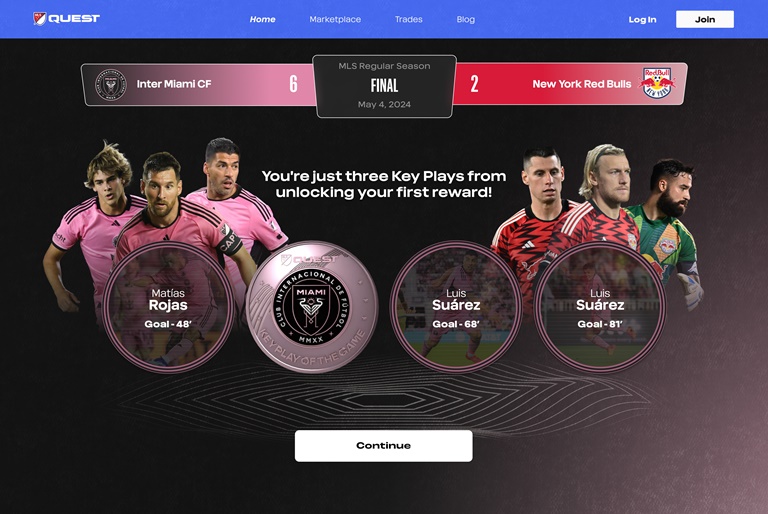
[ad_1]
I’ll be tuning into a couple of SBJ Dealmakers sessions today. “Partner Insight: Leveraging Technology to Maximize Your Investments” will feature Bay FC’s Jen Millet, Next League’s Juan De Jesus and Dynasty Equity’s Arun Manikundalam. And later today, StatusPro’s Andrew Hawkins, OpenSponsorship’s Ishveen Jolly and 15 Seconds of Fame’s Adam Resnick will share some of their founding stories in “Entrepreneurs Spotlight: Lessons in Successful Scaling.” Check out highlights from the two conversations in tonight’s SBJ Tech newsletter. – Ethan Joyce
In today’s edition of Power Up:
World Rugby, Prevent Biometrics sign extension
A look into MLS-Sweet partnership
Form goggles sold through Apple site, select stores
World Rugby and Prevent Biometrics have agreed on a three-year extension of the Head Impact Assessment (HIA) protocol that mandates athletes in World Rugby’s elite-level competitions wear Prevent’s instrumented mouthguards.
The mandate, effective since January, required a $2.4M investment in 2024 from World Rugby to fit and distribute custom, sensor-embedded mouthguards to more than 8,000 rugby players worldwide, plus staff teams with support staff to help operate the technology. The OPRO-produced mouthguards track linear and angular accelerations and trigger Bluetooth alerts when head impacts register above a certain threshold, flagging players to be evaluated for potential concussions.
The extension was first announced by World Rugby Chief Medical Officer Éanna Falvey at the World Rugby Medical Commission Conference last week.
RELATED: World Rugby uses Prevent Biometrics mouth guards to collect data on head impacts
NFT platform operator Sweet is launching a new blockchain-based collectibles marketplace and gaming experience called MLS Quest under licensing agreements with the soccer league and its players’ union.MLS Quest
NFT platform operator Sweet is launching a new blockchain-based collectibles marketplace and gaming experience called MLS Quest under licensing agreements with the soccer league and its players’ union. By playing MLS Quest, fans can collect NFTs in the form of virtual medallions featuring highlights of key plays from MLS matches that can be redeemed for real-life MLS-themed rewards and traded with other users. Financial terms of the MLS and MLSPA’s licensing agreements with Sweet were not disclosed.
MLS is the second major North American sports league to license its intellectual property to Sweet for a digital collectibles initiative, joining the NHL. Sweet launched the NHL Breakaway platform last November after first announcing its deals with the NHL, NHLPA and NHL Alumni in June 2022. Competitor Dapper Labs operates both NBA Top Shot and NFL All Day, while Candy Digital is MLB’s partner in the blockchain collectibles space.
The popularity of NFT trading has fallen off considerably in the years following the COVID-19 pandemic. According to CryptoSlam, a website that tracks NFT sales activity, monthly NFT sales volume peaked in January 2022, when more than $6 billion worth of the assets were sold in more than 13 million transactions. In September 2024, $304M worth of NFTs were sold – a decline of 95% from the peak – in more than 5 million transactions.
Sweet CEO Tom Mizzone, however, said projects focused on gameplay rather than transactional returns have been successful in finding and maintaining audiences. That’s the philosophy behind MLS and Sweet allowing fans to begin playing for free and collect medallions through QR codes at physical locations, on MLS match telecasts and online.
“For every example of a marketplace that’s down, I can give you an example of a game that’s well built using Blockchain that’s crushing it,” Mizzone said. “Set these things up the correct way, focus on the consumer experience and not lead with NFTs and drops, but bring the core tenants of Web 3.0 along for the ride, you’ve got magic.”
MLS Senior VP of Emerging Ventures Chris Schlosser echoed that sentiment, pointing to Quest as a vehicle to engage fans rather than something else to sell them. He’s also hopeful that the experience will both appeal to existing MLS fans and attract gamers and collectors to the sport for the first time.
“Sweet had a vision for a fan experience that was really fun and really engaging, and that got us excited,” Schlosser said. “A lot of the [first iteration of NFT initiatives] were just basically monetization engines. ‘Let’s go sell something. Let’s sell, sell, sell.’ And that’s not the focus here.”
Revenue streams associated with MLS Quest will include the sale of medallion “packs” (which Sweet is holding off on at launch in favor of promoting free methods of acquiring medallions), royalties from peer-to-peer sales of medallions and a forthcoming subscription service for premium game functionality and weekly packs. It’s unclear whether MLS and the MLSPA receive a portion of revenue beyond an initial licensing fee.

By playing MLS Quest, fans can collect NFTs in the form of virtual medallions featuring highlights of key plays from MLS matches that can be redeemed for real-life MLS-themed rewards and traded with other users.MLS Quest
Form’s Smart Swim 2 goggles – the swim training company’s latest generation of augmented reality training goggles – will be available for purchase in select Apple Stores throughout the U.S., and also via Apple website in the U.S., Canada and the United Kingdom starting on Nov. 5.
In the last year, Form has launched HeadCoach, a real-time visual feedback aid, and also integrated with triathlete training platform TriDot. Recently, Form also created Script, which allows users to generate workouts from outside sources (such as other training programs) for use in goggles and tracking in the Form app.
1/2
2/2
PREVIOUS
NEXT
[ad_2]
Copyright for syndicated content belongs to the linked Source link



